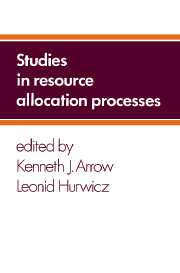Book contents
- Frontmatter
- Contents
- Preface
- Acknowledgments for reprinted articles
- PART I General introduction
- PART II Economies with a single maximand
- 1 General survey
- 2 Static characterization
- 3 Decentralization within firms
- 4 Dynamic characterization
- 5 The handling of nonconvexities
- PART III Economies with multiple objectives
- PART IV General characterizations of allocation processes
- Appendix: An optimality criterion for decision-making under ignorance
- Author index
- Subject index
- Index of examples
3 - Decentralization within firms
Published online by Cambridge University Press: 04 April 2011
- Frontmatter
- Contents
- Preface
- Acknowledgments for reprinted articles
- PART I General introduction
- PART II Economies with a single maximand
- 1 General survey
- 2 Static characterization
- 3 Decentralization within firms
- 4 Dynamic characterization
- 5 The handling of nonconvexities
- PART III Economies with multiple objectives
- PART IV General characterizations of allocation processes
- Appendix: An optimality criterion for decision-making under ignorance
- Author index
- Subject index
- Index of examples
Summary
The increasing span of government control over economic life in the last fifty years has directed the attention of economic theorists to the relative merits of centralization and decentralization in economic decision-making.
If the aim of the economic system is something like the maximization of national income, it may be asked whether it is better to make the economic decisions in a central agency where information relating to the entire system can be used or in the many independent units which characterize a capitalist economy such as ours.
In the course of this great debate, the role of the price system in coordinating many individual decisions has been given stronger and stronger recognition, although the idea itself already appears in Adam Smith's famous “invisible hand.”
There is also growing concern in the field of industrial management with the administration of large business corporations. Again there arises the issue of centralization vs. decentralization. To what extent is it necessary for the efficiency of a corporation that its decisions be made at a high level where a wide degree of information is, or can be made, available? How much, on the other hand, is gained by leaving a great deal of latitude to individual departments which are closer to the situations with which they deal, even though there may be some loss due to imperfect coordination?
A representative collection of management viewpoints on this issue is found in the proceedings of a conference held in The Netherlands some years ago.
- Type
- Chapter
- Information
- Studies in Resource Allocation Processes , pp. 134 - 145Publisher: Cambridge University PressPrint publication year: 1977
- 1
- Cited by



